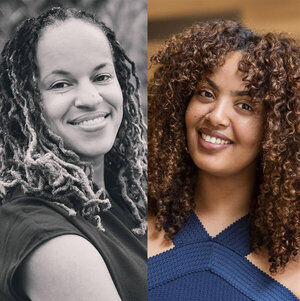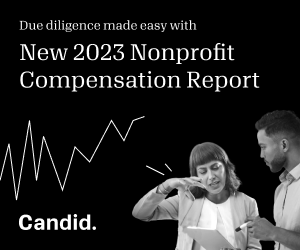Black Philanthropy Month reminds us that philanthropy must still make good on racial justice promises

The uprising for racial justice that was ignited by the murder of George Floyd at the hands of Minneapolis police still reverberates today. Notably, people with power and wealth seemingly took note, with institutions, companies, and organizations vowing to change and allocate more resources to advancing racial equity and justice. Many foundations made a two-part commitment: to direct more resources to racial equity and justice initiatives and to center Black voices in their efforts.
But Black Philanthropy Month and the 2022 theme of the “Fierce Equity of Now! From Dream to Action” is a higher calling of philanthropy and a sober reminder that philanthropy still has a long way to go. The sector as a whole has not yet made significant progress on these goals. To attain the stated aims of racial equity and justice, philanthropy must follow through on the second part of its commitment and shift power to Black-led change.
This path forward includes social, economic, and political change led by diverse groups of Black people centering the power, interests, and well-being of Black communities that often benefits all communities. Examples of Black-led change include the global anti-colonial response of Black nations to the U.S. Civil Rights Movement and most recently, the movement for Black lives.
While philanthropy’s renewed commitment to fighting racial injustice and learning from Black leaders on the ground was encouraging, the dollars have not yet been commensurate. According to estimates in the seminal report Mismatched: Philanthropy's Response to the Call for Racial Justice by the Philanthropic Initiative for Racial Equity, as of summer 2021, the sector had pledged more than $8.8 billion for racial equity work in 2020, but only about $3.4 billion in grants had actually been awarded by foundations and corporations—3.3 percent of the total foundation and corporate giving in 2020. In addition, the report notes that “more than a third of the top 20 racial equity recipients were founded by white billionaires or large corporations advancing their own theories of change in mostly Black, Brown, and Indigenous communities, often independent of or in direct opposition to calls from racial justice movement leaders.” Moreover, when investments are made to support Black-led change, these organizations often receive less money and are held to a higher accountability standard than white-led organizations. This paradox is crushing and counterproductive to progress.
When Black-led change is not valued and sustained, it often results in the delay or loss of transformational gains, and we all suffer. For instance, Minneapolis continues to grapple with the much-needed courageous charge to improve safety of all residents by reevaluating the police department’s relationship with its school system and other public entities. Last November, the City of Minneapolis did not pass a proposal to replace the Minneapolis Police Department with a Department of Public Safety that would have partnered police with qualified social and mental health workers to increase community safety through “a comprehensive public health approach.” More recently, the Park Board reinstated its relationship with the department to police public parks. The back and forth and tensions of change that exist in the root city of the 2020 uprising demonstrate the nuances of movements to shift power. Black-led change understands nuance and even harnesses it to center the lived experience and vision of people most impacted by the issues at hand to imagine and bring to life a new world.
We see exactly how Black-led change in Minneapolis and across Minnesota continues to inspire the nation as the fight continues against the racism and white supremacy deeply rooted in our institutions and culture. For example, while the proposal to establish a Department of Public Safety did not pass, because of Black-led organizing, 44 percent of voters supported it and leaders across the city are working to bring it to life in creative ways, which signals a growing appetite for meaningful change. In addition, while working to change existing systems, Black people are creating new models of safety. Relationships Evolving Possibilities (REP), a Black-led initiative formed in 2020 in Minnesota, is an inspiring example of dedicated networks of changemakers supporting the community in times of crises rooted in love and dignity of people in need of help. In the most difficult days of the pandemic, Black-led change increased the use of mutual aid to support communities—which continues today.
Black leaders in Minnesota also established the MN Black Collective Foundation (the Collective) in May 2020 in response to the tragic murder of George Floyd, today the state’s first community-led and culturally rooted Black foundation. Initially named the Philanthropic Collective to Combat Anti-Blackness and Realize Racial Justice, the Collective began as a Black-led movement working in partnership with philanthropic institutions to transform philanthropy. Since then, the Collective has strategically evolved to be the home of Black-led change in Minnesota and build Black philanthropic power through establishing the first self-determined, Black community-led foundation in Minnesota. This evolution happened in real time to accurately reflect the dedication, time, and resources needed to address racial injustice, with many philanthropic partners standing in power-shifting solidarity with the Collective.
A key lever for change of the Collective is truth telling and accountability, which is why over the next year, the Center for Evaluation Innovation and the Collective will partner to advance systems change imperatives. On this learning journey, we are asking questions such as: How do communities of Black-led changemakers define anti-Blackness, racial justice, and Black-led social change? Are these definitions in alignment with local philanthropy’s investment in racial equity and justice? And finally: How can we shift the philanthropic gaze so that foundations are accountable to Black-led change?
Using a power-shifting solidarity approach
Long-term systemic change requires us to recognize the capacity, strategic strength, and leadership that is driving transformational change on the ground. When philanthropy and Black-led change show up in power-shifting solidarity, our line of sight to create systems transformation becomes clear. Power-shifting solidarity looks like embracing shared accountability, showing up as learners, and changing at the speed of courage.
- Philanthropy must embrace accountability: Accountability helps us understand how well our actions align with our values. Philanthropy must commit to being accountable to Black, Native, Asian and Pacific Islander, and Latinx communities, and all people and lands that have been exploited and/or underinvested in. Power-shifting solidarity would look like evolving or creating systems rooted in the community’s vision for change that support transparent, shared accountability.
- Showing up as learners: As racial justice practitioners, our job is to learn every day and we must reclaim evaluation as a tool for justice. We must hold strategy and learning together and allow for real-time shifts based on what is emerging in the moment. This looks like philanthropy investing in its own capacity to actively learn in real time as it supports Black-led change. This is how we will win.
- Change at the speed of courage: The courage that ignited a once-in-a-lifetime uprising for justice must remain at the core of our approach for change. Changing at the speed of courage means being in constant practice of ideas, processes, conversations, study, programs, struggle, and relationships out of our comfort zone but necessary to imagine and create a new world of liberation for all people. It prioritizes each of our individual and collective will and actions to transform rather than short-term outcomes that uphold the status quo. And it means extending grace for experiments and failures, understanding these are part of solving the magnitude of the issues before us. Finally, changing at the speed of courage also means funding courageously and relentlessly, without oppressive strings, the Black-led change that has proven itself time and time again.
Combating anti-Blackness requires centering the dignity and power of Black people. Black-led change does this. Transformation is key for philanthropy to truly address racial injustice but it requires power-shifting and real solidarity between philanthropy and Black-led change. Black-led change has made progress against the current, but imagine the possibilities if philanthropy invested in alignment with its genius. If philanthropy and Black-led change operate with solidarity as a first principle, our capacity to realize racial justice and create the world we envision will be limitless.
Dr. Chera Reid (she/hers) is co-executive director of the Center for Evaluation Innovation, whose mission is to partner with philanthropy to provide changemakers the space and resources needed to advance racial justice and create an equitable future.
Lulete Mola (she/hers) is co-founder and first president of the MN Black Collective Foundation, which works to advance the genius of Black-led change. Ms. Mola is based in Minnesota.






